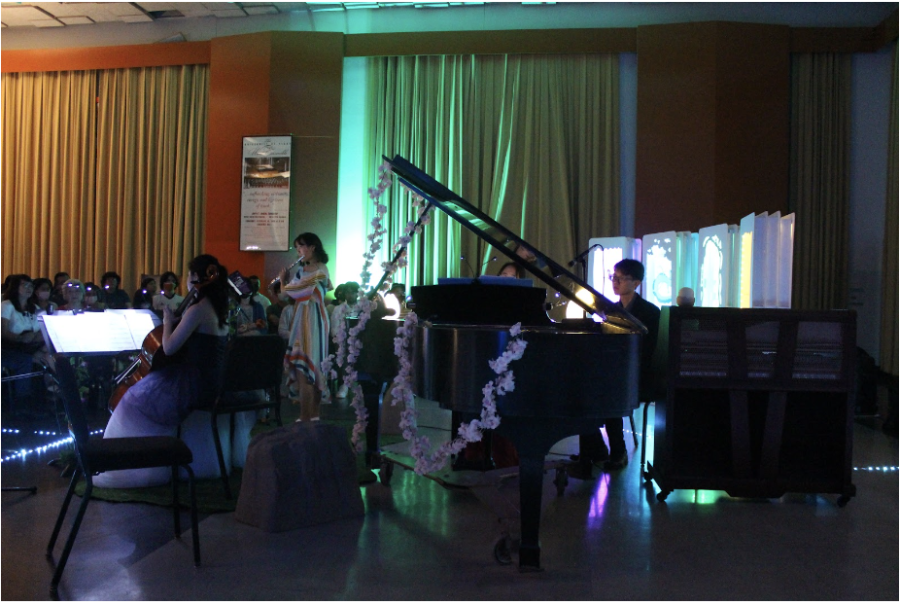Studio Ghibli Still Splashing
May 4, 2022
Studio Ghibli is a Japanese animated film studio that has been around since 1985. It is known for classic works like “Spirited Away,” which won the best animated feature in 2003, and “My Neighbor Totoro,” which won the Kinema Junpo award for best film in 1989. The Asian Memory Project is a group of Asian-American artists who celebrate their heritage through many mediums of art, and have recently decided to spotlight Studio Ghibli’s music as especially emblematic of Asian-American heritage. Project lead Dorothy Le started the project as a way to amplify the voices of Asian-Americans.
“I was devastated by the salon shooting in Atlanta and the exponential rise in anti-Asian attacks.” Le said. “I knew I had to do something to create space for Asian-Americans, so I chose to amplify our collective stories and voices through multimedia art.”
According to Le, Studio Ghibli movies are filled with so much nostalgia that just hearing their soundtracks inspired Le to start this project.
“I discovered Studio Ghibli films when I was around 12,” Le said. “As a kid, I thought Ghibli films had the most beautiful music I’ve ever heard. My dream job was to play in an orchestra that performed this music, but apparently that job didn’t really exist. That didn’t stop me from creating this job for myself. My favorite theme as a kid was the reprise from Spirited Away.”
The event planning process started during the pandemic. Inspired by rhythm and blues artist Jhene Aiko, Le wanted to find a change in how classical concerts would present themselves to their audiences.
“I wrote out a list of how I wanted to change classical concert practices and I asked my friends how concerts could better cater to the audiences,” Le said. “I sent a couple emails about my idea for an intimate Ghibli concert into the abyss, not knowing if anyone would understand or even care about my idea. Professor James Gabrillo graciously replied and he agreed to mentor me throughout this process. After creating a vision for this event, I presented it to my flute professor, Marianne Gedigian. She whole-heartedly accepted my vision and helped me craft the musical journey and community engagement aspects.”
Working on a project as big as this one is better with multiple people, according to Maya Hazarika, one of the staging designers with the Asian Memory Project. She described how Studio Ghibli has impacted her and the skillset she brings to the team.
“I am in a six year dual degree program at UT for Architecture and Architectural Engineering,” Hazarika said. “I grew up watching Miyazaki movies. Kiki’s Delivery services was my introduction to Ghibli. I’ve dressed up as her for Halloween multiple times in my life.”
One of the big parts of the set design were the four stands with colored lights. Each of the stands represented a recognized movie from Studio Ghibli.
“This project was a really fun way to connect with my inner child,” Hazarika said. “It was also an opportunity to mesh my creative arts skills and my technical engineering skills to build large physical models that served a visual purpose. It was amazing to work with a large group of fellow Asian-Americans to produce something that would connect people together through shared experience.”
A very important part of this concert was finding a way to arrange the music to fit the instruments that would be played. Daniel Kim, one of the team’s composers, described the process of rewriting music for the performances.
“It was initially tough to figure out how to reduce whole orchestral tracks to just three instruments, especially since the first few I wrote for five players before Dorothy reduced it,” Kim said. “It’s okay for piano since it can cover lots of notes. But, single-voiced instruments with limited ranges like the cello and flute needed to be approached creatively to give them lines that are playable, yet interesting and enjoyable to play.”
As the project lead there can be many challenges that are faced while working on a project as big as a concert. Le directs many aspects of the project, but with all the leadership she also needs time to recharge.
“I think the most difficult part is being one step ahead of the planning while maintaining my boundaries,” Le said. “Sometimes when I delegate responsibilities, it comes right back to me. Even though I deeply care about my team and the project, it’s not work, work, work all the time. As the lead, I need personal time to recharge and take care of my physical and mental health. This is at the core of being a good leader for me personally.”
Both performances were done in the Butler school of music at the University of Texas. The Asian Memory Project is planning on playing more Studio Ghibli features at the Austin Central Library in July.


